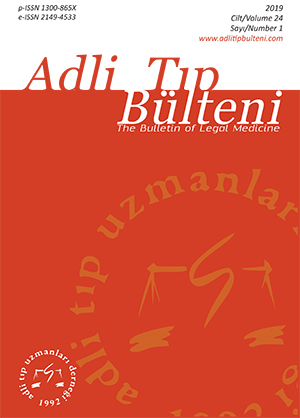The Effect of Hypoglicemia on Criminal Liability In Diabetic Patients
DOI:
https://doi.org/10.17986/blm.2019149819Keywords:
patients with diabetes, criminal discretion, criminal responsibility, behaviourAbstract
It is common for people who are charged with crime to assert that their will is not in place during the action of the crime by asserting health problems in their defense to avoid unfair penal sanctions. In this regard, mental health disorders are the most common. However, other health problems affecting the state of consciousness should not be forgotten. Diabetes patients may also claim that their will is disabled in the crimes committed in the attack of hypoglycemia. There are also known chronic complications such as vision loss, renal failure, heart attack, personality changes in long-term diabetes patients, as well as acute treatment complications such as hypoglycemia and neuroglycopenia, which are caused by high-dose insulin therapy and are characterized by impaired cognitive functions. The courts can therefore request expert opinion from the forensic experts on the determination of the person's criminal liability. In this article, it is aimed to discuss the cases of hypoglycemia and neuroglycopia, which is a common treatment complication in diabetic patients, and whether or not cognitive and cognitive disorders in the individual can affect criminal responsibility, and if so, the extent to which these effects may affect the case.
References
Alacakaptan U. Suçun Unsurları. Ankara: Ankara Üniversitesi Hukuk Fakültesi Yayınları; 1975.
Frier B, Maher G. Diabetes and Hypoglycaemia: Medicolegal Aspects of Criminal Responsibility. Diabetic Medicine. 1988;5(6):521-6. https://doi.org/10.1111/j.1464-5491.1988.tb01044.x
Diabetes [Nov, 2017]. Available from: http://www.who.int/mediacentre/factsheets/fs312/en.
Braunwald E, Fauci A, Kasper D, Hauser S, Longo D, Jameson J. Harrison iç hastalıkları prensipleri. Cilt. 2004;1:90-4.
Low Blood Glucose (Hypoglycemia) [Nov 21, 2016]. Available from: https://www.niddk.nih.gov/health-information/diabetes/preventing-diabetes-problems/low-blood-glucose-hypoglycemia.
Diseases and Conditions Hypoglicemia [Jan 20, 2015]. Available from: http://www.mayoclinic.org/diseases-conditions/hypoglycemia/basics/symptoms/con-20021103.
Ray KK, Seshasai SRK, Wijesuriya S, Sivakumaran R, Nethercott S, Preiss D, et al. Effect of intensive control of glucose on cardiovascular outcomes and death in patients with diabetes mellitus: a meta-analysis of randomised controlled trials. The Lancet. 2009;373(9677):1765-72. https://doi.org/10.1016/S0140-6736(09)60697-8.
Frier B. Hypoglycaemia and cognitive function in diabetes. International journal of clinical practice Supplement. 2001(123):30-7.
Horwitz D. Factitious and artifactual hypoglycemia. Endocrinology and metabolism clinics of North America. 1989;18(1):203-10.
Collins M, Corcoran P, Perry I. Anxiety and depression symptoms in patients with diabetes. Diabetic Medicine. 2009;26(2):153-61. https://doi.org/10.1111/j.1464-5491.2008.02648.x
Park M, Reynolds CF. Depression among older adults with diabetes mellitus. Clinics in geriatric medicine. 2015;31(1):117-37. https://doi.org/10.1016/j.cger.2014.08.022.
Ciechanowski PS, Katon WJ, Russo JE. Depression and diabetes: impact of depressive symptoms on adherence, function, and costs. Archives of internal medicine. 2000;160(21):3278-85. https://doi.org/10.1001/archinte.160.21.3278.
Musselman DL, Betan E, Larsen H, Phillips LS. Relationship of depression to diabetes types 1 and 2: epidemiology, biology, and treatment. Biological psychiatry. 2003;54(3):317-29. https://doi.org/10.1016/S0006-3223(03)00569-9.
Dandona P, Chaudhuri A, Dhindsa S. Proinflammatory and prothrombotic effects of hypoglycemia. Diabetes Care. 2010;33(7):1686-7. https://doi.org/10.2337/dc10-0503.
Merbis M, Snoek F, Kanc K, Heine R. Hypoglycaemia induces emotional disruption. Patient education and counseling. 1996;29(1):117-22. https://doi.org/10.1016/0738-3991(96)00940-8.
McCrimmon RJ, Ewing FM, Frier BM, Deary IJ. Anger state during acute insulin-induced hypoglycaemia. Physiology & behavior. 1999;67(1):35-9. https://doi.org/10.1016/S0031-9384(99)00036-0.
What effect does diabetes have on the criminal law (motoring)? http://www.inbrief.co.uk/motoring-law/diabetes-driving-laws/.
Pashler H. Encyclopedia of the Mind: SAGE; 2013.
Hendy J, Hutchinson O. Optimize Criminal Law: Routledge; 2015.
Beaumont G. Automatism and hypoglycaemia. Journal of forensic and legal medicine. 2007;14(2):103-7. https://doi.org/10.1016/j.jcfm.2006.01.010.
Cases On Automatism | Free Criminal Law Cases [21/11/2016]. Available from: http://www.lawteacher.net/cases/criminal-law/automatism-cases.php.
Marks V. Hypoglycaemia: accidents, violence and murder. Part 1. Practical Diabetes International. 2005;22(8):303-6. https://doi.org/10.1002/pdi.854.
Langevin R, Langevin M, Curnoe S, Bain J. The prevalence of diabetes among sexual and violent offenders and its co-occurrence with cognitive impairment, mania, psychotic symptoms and aggressive behavior. International journal of prisoner health. 2008;4(2):83-95. https://doi.org/10.1080/17449200802038215
Downloads
Published
Issue
Section
License
Copyright (c) 2019 Ayşe Derya Kaynak- Ali Rıza Tümer

This work is licensed under a Creative Commons Attribution 4.0 International License.
The Journal and content of this website is licensed under the terms of the Creative Commons Attribution (CC BY) License. The Creative Commons Attribution License (CC BY) allows users to copy, distribute and transmit an article, adapt the article and make commercial use of the article. The CC BY license permits commercial and non-commercial re-use of an open access article, as long as the author is properly attributed.

